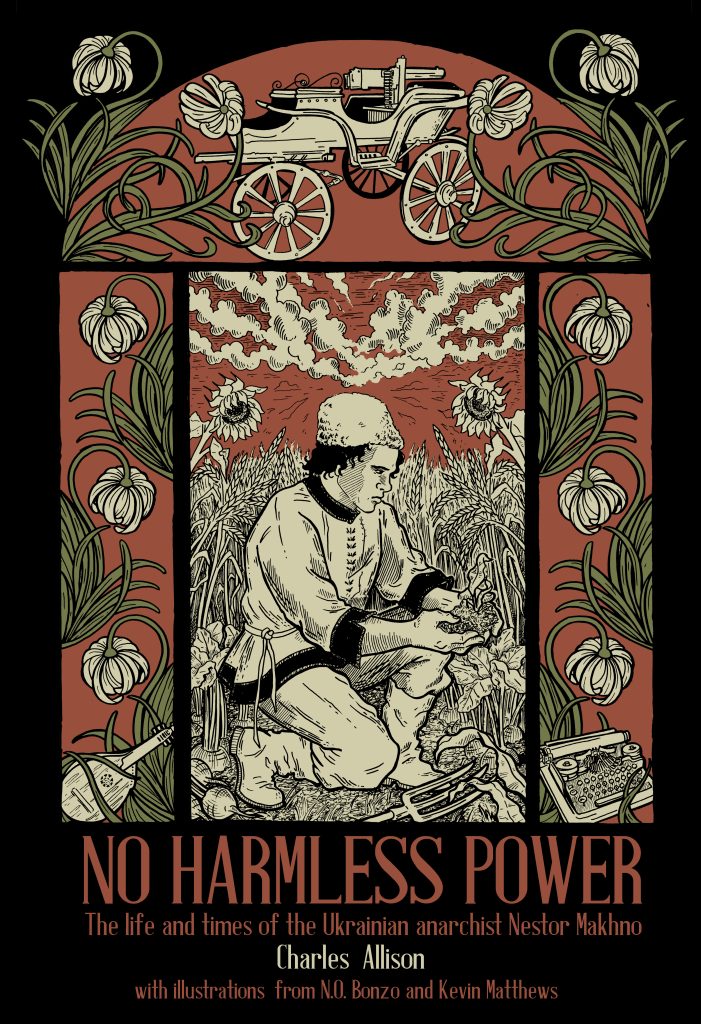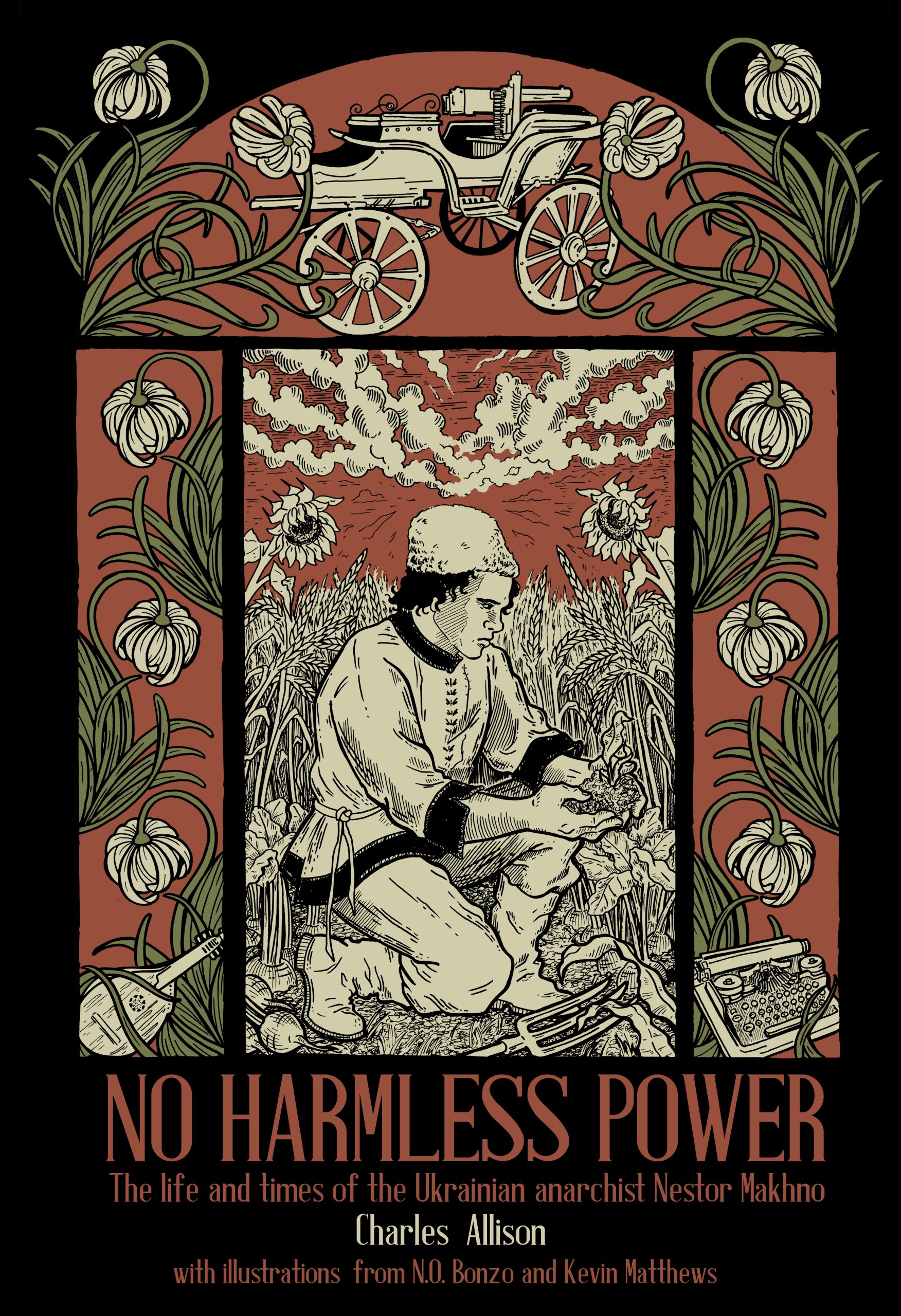By Gabriel Kuhn and Ole Birk Laursen
LeftTwoThree
A joint review of Charlie Allison, No Harmless Power: The Life and Times of the Ukrainian Anarchist Nestor Makhno (Oakland: PM Press, 2023) and Ole Birk Laursen, Anarchy or Chaos: M.P.T. Acharya and the Indian Struggle for Freedom (London: Hurst & Company, 2023).
I received two biographies of anarchists in recent weeks and figured I could do a joint review. Both cover a similar time span, namely, the first half of the twentieth century. Other than that, they are quite different. One is about an anarchist superstar, Nestor Makhno, the other about a virtual unknown, M.P.T. Acharya. There’s been quite some interest in Makhno recently due to the situation in Ukraine, which the man called home. Acharya, who passed away in 1954, is a towering figure in Indian anarchism.
The Makhno biography is titled No Harmless Power: The Life and Times of the Ukrainian Anarchist Nestor Makhno. The author is Charlie Allison, who had done a video series on Makhno before.
Allison chronicles the life of Makhno in a very accessible manner. There’s a good dose of humor without letting the seriousness of the topic slide. War, revolution, and exile are no lighthearted matters. The book is beautifully illustrated by N.O. Bonzo and Kevin Matthews.
It’s not the first account of Makhno’s life I have read, but I learned that – if Allison’s judgment is to be trusted – I have more in common with him than I thought: “Nestor Makhno had the distressing habit of wanting to get everything done himself. In short, he didn’t like to delegate.” Sounds highly familiar.
Some of the anecdotes included in No Harmless Power take on particular significance in light of the current war in Ukraine, for example Makhno’s dislike for people who, such as Lenin, called Ukraine “South Russia.”
Out of the chapters of Makhno’s life, I’ve always been particularly intrigued by his last years in Paris. There is something fascinating about people who have spent years in the middle of a revolutionary storm suddenly eking out an existence as anonymous drifters in faraway places. And, of course, there’s the “Platform”, authored by the political circle Makhno hang with in Paris, and quite influential in anarchist discussions to this day.
Allison sets the stage and discusses the Platform. His conclusion: “Makhno’s creation of the Platform might have been the most important thing he ever did outside of a battlefield – the tragedy of the Platform was that it was introduced in a time and place singularly unsuited to its implementation, limited by the personal weaknesses and feuds of those who proposed it, to lie dormant until almost a century later.”
By choosing introductory quotes from a wide range of authors to the twenty-one chapters of his book, Allison gives the Platform a synthesist framing (a tip to anarcho geeks). In his Acknowledgments, he finds particularly kind words for Hans Magnus Enzensberger – what seems impossible among German-speaking radicals, remains possible elsewhere. Why not?
A fascinating aspect of pretty much any biography of an early-twentieth-century anarchist are the international connections they reveal way before there was the internet. Shared ideals allowed people to establish strong bonds based on occasional visits and letters that could take weeks (or months) to arrive.
That’s also a feature in Ole Birk Laursen’s book Anarchy or Chaos: M.P.T. Acharya and the Indian Struggle for Freedom. Acharya, arguably the most prominent anarchist from India during the first half of the twentieth century (or the entire century?), was born in Madras in 1887. He would soon travel far and wide, leaving India in 1909 and returning not before 1935. Acharya did not only spend years in Paris and London (common stomping grounds at the time for radicals from the colonies) but also in Berlin and Stockholm (both places very familiar to the author of these lines).
Politically, Acharya came to anarchism through the communist movement. It’s a political trajectory not unlike those of many radicals in Asia at the time, but the lives of communist-turned-anarchists in China and Japan are much better documented.
Laursen, who had been working on the book for ten years and has gone through a breathtaking amount of sources, is breaking new ground here. Anarchy or Chaos is not only a book about an Indian anarchist; in its 360 pages, we learn a lot about the early global communist movement, anarchism, antiimperialism, and the anticolonial struggle in India.
With regard to antiimperialism, it seems that Acharya could have been a reference point in my article “Antiimperialism Is for Everyone,” had I known more about him when I wrote it. We get educated by the minute.
Laursen also discusses Gandhi, who some folks associate with anarchism. While Acharya generally paid the famous Indian independence leader respect, he remained, in Laursen’s words, “ambivalent about the Mahatma’s ideas and practices.” Considering Acharya’s own significance for the anarchist movement in the country, Laursen suggests that his passing in 1954 put “an end to anarchism in India.”
With regard to the international network of anarchists that we, inevitably, encounter in books like these, it is always interesting to see who turns up. German anarchist Augustin Souchy always seems to be in the mix; it appears that he was connected with everyone. Helmut Rüdiger, a German who spent many years in Sweden, is prominently represented in Anarchy or Chaos due to the time Acharya spent in Stockholm. More unexpected characters show up as well, such as the Dutch-born anarchist and soccer enthusiast Nicolaas Steelink, who I dedicated a chapter to in my book Soccer vs. the State.
It is nice to read that Acharya could rely on financial support from his anarchist friends across the world during his final years in India. He was in poor health, and his life was far from luxurious, but the old comrades were there for him. One of many heartening aspects of a fine publication.
Gabriel Kuhn
(November 30, 2023)







